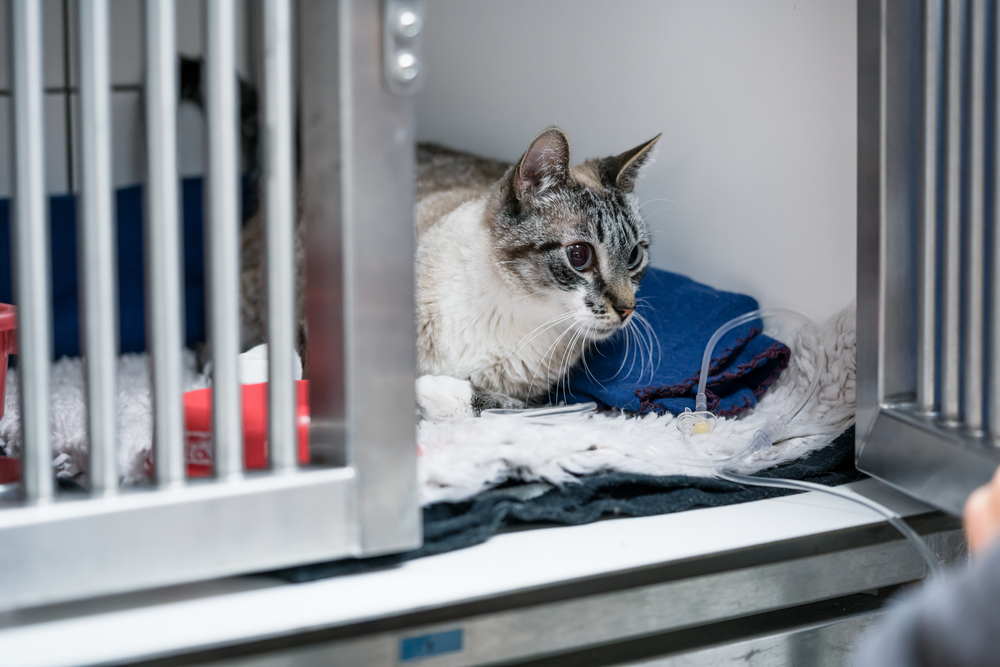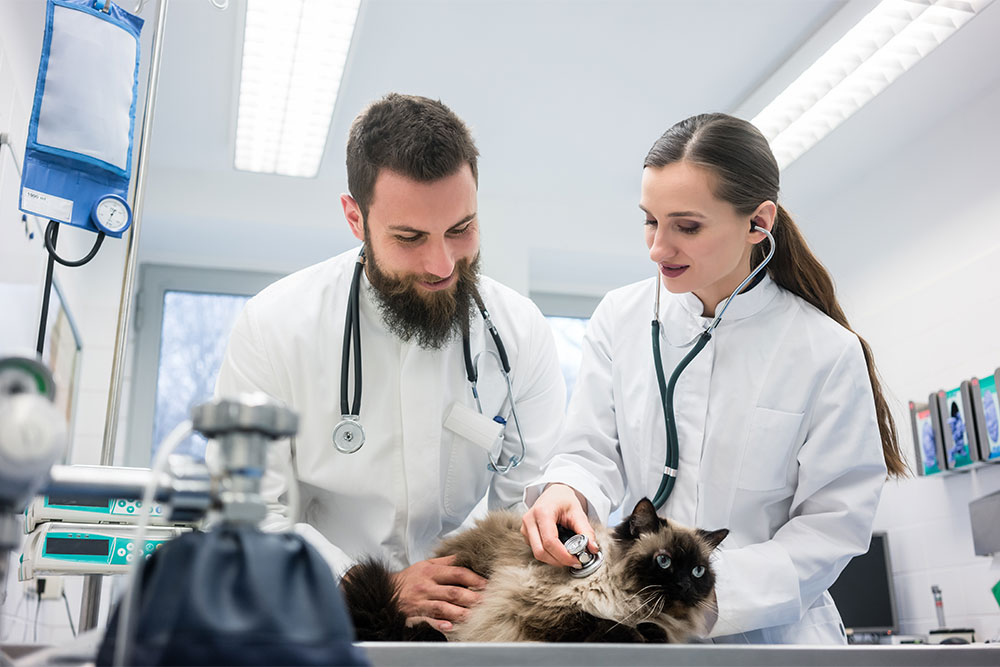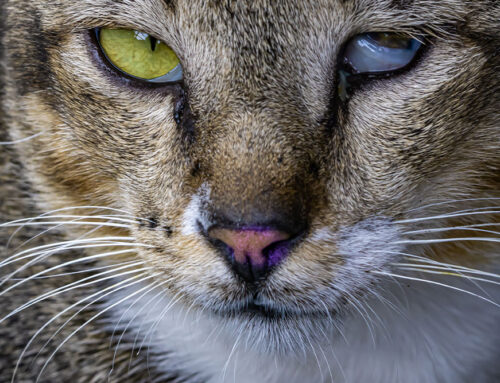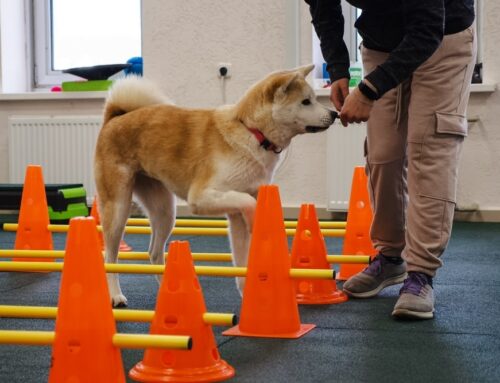Chronic kidney disease (CKD) is one of the most common and challenging conditions seen in older cats and dogs. It develops gradually, and continues to worsen as your pet ages. Pets with CKD often face sudden setbacks like vomiting, anemia, loss of appetite, or dramatic changes in hydration that can quickly become life-threatening. These acute episodes require immediate, expert intervention.
At Omega Veterinary Group, our specialty-trained criticalists and emergency team provide 24/7 intensive care for pets with CKD who experience acute crises. With advanced diagnostics, round-the-clock monitoring, and a collaborative team of specialists, we help pets stabilize, recover, and return to their long-term management plans.
Understanding CKD and Why Acute Episodes Occur
Healthy kidneys filter toxins, balance electrolytes, regulate blood pressure, and support red blood cell production. In CKD, these functions decline as microscopic filters called nephrons are permanently lost. The damage is progressive and irreversible, which is why even pets with seemingly stable disease can suddenly crash.
Veterinarians use the IRIS kidney disease staging system to classify CKD from early to advanced. Yet at every stage, acute episodes may develop when the remaining kidney tissue can no longer compensate or if other illnesses add to the stress. Common triggers include:
- Dehydration from excessive urination, vomiting, or diarrhea that overwhelms home fluid therapy.
- Concurrent conditions such as uncontrolled Feline Hyperthyroidism that accelerate kidney damage.
- Infections or toxins that place sudden stress on already fragile kidneys.
- Sudden dietary or medication changes that disrupt electrolyte balance or blood pressure regulation.
Just as important are the secondary complications of CKD that often drive ICU admission:
- Anemia: reduced red blood cell production causes weakness, collapse, and in severe cases the need for blood transfusions.
- Systemic Hypertension: persistently high blood pressure may lead to seizures, nosebleeds, or acute blindness that requires immediate stabilization.
- Renal Secondary Hyperparathyroidism: disrupted calcium and phosphorus balance weakens bones and can cause painful fractures or muscle twitching.
- Hypertensive Retinopathy: high blood pressure damages delicate eye structures, sometimes leading to sudden, irreversible blindness without urgent care.
Each of these complications does more than affect quality of life- they create emergencies. An anemic cat that cannot deliver oxygen to tissues, a hypertensive dog at risk of stroke, or a uremic patient with uncontrolled vomiting all need 24/7 ICU monitoring, intravenous therapies, and rapid access to advanced interventions. That is why critical care is often the safest and most effective response when CKD patients spiral into crisis.
Red Flags That Signal a Kidney Crisis
Because CKD patients are fragile, owners need to recognize when a problem requires emergency care. Warning signs include:
- Sudden vomiting, diarrhea, or refusal to eat
- Collapse, extreme lethargy, or disorientation
- Signs of dehydration despite home fluid support
- Seizures, blindness, or unusual behavior caused by severe hypertension
- Large increases in thirst or urination
If you notice any of these changes, contact Omega’s emergency team immediately through our 24/7 contact line.
What Happens in the ICU During an Acute CKD Episode
Acute kidney crises require far more than standard outpatient care. At Omega Veterinary Group, our ICU is designed for fast response, round-the-clock monitoring, and advanced interventions to keep fragile CKD patients safe.
Stabilization and Intensive Support
Most pets arrive dehydrated, unstable, or in shock. Within minutes of admission, our team begins tailored IV fluid therapy to restore circulation, correct dangerous electrolyte shifts such as high potassium, and deliver anti-nausea medication, appetite stimulants, and pain relief. Oxygen support is provided when breathing is compromised, and blood pressure management begins immediately for patients in hypertensive crisis.
Once stabilized, ICU patients may require advanced therapies to address the complications of CKD. These include:
- Oxygen therapy or mechanical ventilation for severe respiratory distress
- Blood pressure control for pets with systemic hypertension
- Blood and plasma transfusions for anemic patients
- Dialysis or specialized fluid therapy for pets unable to clear toxins on their own
- Nutritional and pain management support for debilitated animals
Continuous Monitoring
Critical care is dynamic. Our ICU team uses hemodynamic monitoring to track blood pressure, urine output, heart rhythm, and kidney function values like creatinine and SDMA in real time. These measurements guide moment-to-moment adjustments in therapy, ensuring every patient receives care tailored to their rapidly changing condition.
What makes Omega unique is our ability to integrate across specialties. If a patient requires urgent imaging, consultation with internal medicine for complex drug adjustments, or surgical support, our team of specialists is on hand to act quickly.
Specialist Oversight
Omega is a criticalist-owned hospital, which means every ICU patient benefits from leadership by a board-certified critical care specialist. Our services include surgery, neurology, anesthesiology, and internal medicine, ensuring that pets with CKD receive integrated care for their entire condition- not just their kidneys.
How ICU Care Protects Long-Term Management
The goal of ICU care is not only to stabilize but to return pets to a point where their CKD can be managed at home. After an acute episode, our team works with families to refine long-term plans that may include:
- Hydration strategies such as at-home sub-cutaneous fluids
- Nutrition tailored to kidney disease stages
- Medication adjustments for blood pressure, anemia, or secondary conditions
- Guidance on home monitoring, blood pressure, and appetite logs
- Advice on senior pet recommendations for checkups and diagnostics
Owners are also counseled on what to watch for, including subtle changes in thirst, litter box patterns, or coat quality that may signal the next episode. These details are vital to catching problems before they spiral.
Preventing Future Crises
While ICU care saves lives, preventing repeat episodes is just as important. That means:
- Regular monitoring and follow-up exams
- Routine bloodwork and urinalysis to track disease progression
- Owner education on red flags and when to seek help
- Minimizing stress and environmental changes for fragile pets
Omega’s services include advanced imaging, dialysis, and nutritional support, all of which help us identify subtle problems early and intervene before the next acute crisis occurs.

Trust Omega Veterinary Group for Kidney Emergencies
Chronic kidney disease is not curable, but with careful management, pets can live comfortably for years. When acute episodes strike, however, only advanced ICU care can provide the immediate stabilization and intensive monitoring that saves lives.
At Omega Veterinary Group, our 24/7 ICU is designed to respond at any hour, led by board-certified criticalists and supported by a full specialty team. Whether your pet is experiencing sudden vomiting, collapse, or complications from hypertension or anemia, we have the expertise, technology, and compassion to guide them safely through a crisis.
If you are concerned about your pet’s kidney health, call our emergency line right away or come directly to our San Mateo hospital. In emergencies, every moment matters- and our team is always ready.
Omega Veterinary Group
251 N. Amphlett Blvd, San Mateo, CA 94401
Contact us 24/7






Leave A Comment